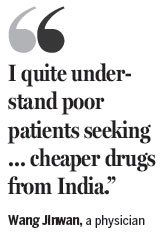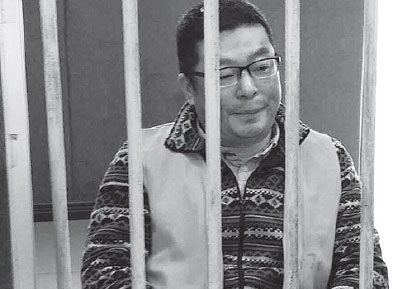Cancer patients look to India for lifesaving drugs
By Shan Juan (China Daily) Updated: 2015-01-28 07:38
Leukemia patient Lu Yong borrowed the idea from the Oscar-winning film Dallas Buyers Club and smuggled unapproved, Indian-made drugs for himself and 1,000 others to get medicines at an affordable price.
Lu was detained by police in Yuanjiang, Hunan province, and his case of allegedly selling counterfeit drugs is still under investigation.
The 47-year-old textile businessman bought a month's supply of the Indian generic version of Gleevec, originally developed and manufactured by Swiss drug company Novartis, for around 200 yuan ($32).
In China, a month's supply of Gleevec costs more than 23,000 yuan, and it is not covered by health insurance in most places.
For many leukemia patients like Lu, either Gleevec or a bone-marrow transplant is the only option for survival.
Lu gave up on a transplant because donors are hard to find in China, and a transplant also carries the risk of potential major side effects. He found the cheaper Indian generic version of Gleevec worked well for him.
However, any unapproved medications are illegal in China, and the China Food and Drug Administration has issued a notice warning cancer patients not to purchase such "illegal" drugs from India through online agents.
In a joint clampdown involving public security and drug authorities, as well as major e-commerce websites like Taobao, many online agents were closed down, and some were imprisoned for selling counterfeit drugs.
Indian generic versions of other expensive cancer medications, such as Iressa, Tarceva and Nexavar, are also hot-selling items among the Chinese.
A Zhejiang-based online agent surnamed Liu said the demand is huge and ever increasing. He has been in business for four years. He quit using Taobao in late 2013 because the Chinese e-commerce giant had frozen the accounts of some Indian pharmaceutical dealers in the government-led campaign to crack down on the business.
Liu said customs checks for imports from India have also been strengthened.
"They used to just do one check in Beijing before April 2014. After that, another check was added at the destination city," Liu said.
He is now contracted with a courier service company, which receives cash from customers upon delivery.
"I contact customers, roughly 600, via cellphone and the QQ messenger service," he said. "But I never meet with them in person as it's a special business."
He said his operations in India run as normal. "It's totally legitimate there."
Jia Ping, a Beijing-based lawyer specializing in public health cases, said the Indian Patents Act, which was amended in 2005, legally bolstered the unlicensed production and marketing of the nation's generic drugs.
The amendment stipulated that only new drug compounds developed after 1995 could be protected.
Many new drugs are in fact improved versions of old drugs and thus not protected under the patent law, Jia said.
Medecins Sans Frontieres, the international NGO committed to public health, says India makes at least one-fifth of the world's generic drugs, and about half the production is sold abroad, often illegally at a fraction of the cost.
According to the National Central Cancer Registry, more than 3 million Chinese developed cancer and 1.96 million died in 2010.
Wang Jinwan, a physician at the Cancer Institute and Hospital of the Chinese Academy of Medical Sciences, expressed deep concern over the plight of patients who cannot afford the treatments.
"I quite understand poor patients seeking to buy much cheaper drugs from India," Wang said.
Seeing 20 cancer patients each day, he said at least one-third of them give up treatment because they can't afford it.
He called on decision-makers to address the issue and help patients to stay alive longer if possible.
"To some extent, Lu Yong in China and Ron Woodroof in Dallas Buyers Club are all heroes struggling for their own and other people's lives," he said.
shanjuan@chinadaily.com.cn

|
Leukemia patient Lu Yong in jail in Yuanjiang, Hunan province, in January 2014, after he was detained by police for allegedly selling counterfeit drugs. Hong Kefei / for China Daily |
(China Daily 01/28/2015 page5)
- Govt encourages people to work 4.5 days a week
- Action to be taken as HIV cases among students rise
- Debate grows over reproductive rights
- Country's first bishop ordained in 3 years
- China builds Tibetan Buddhism academy in Chengdu
- Authorities require reporting of HIV infections at schools
- Typhoon Soudelor kills 14 in East China
- Police crack down on overseas gambling site
- Debate over death penalty for child traffickers goes on
- Beijing to tighten mail security for war anniversary








